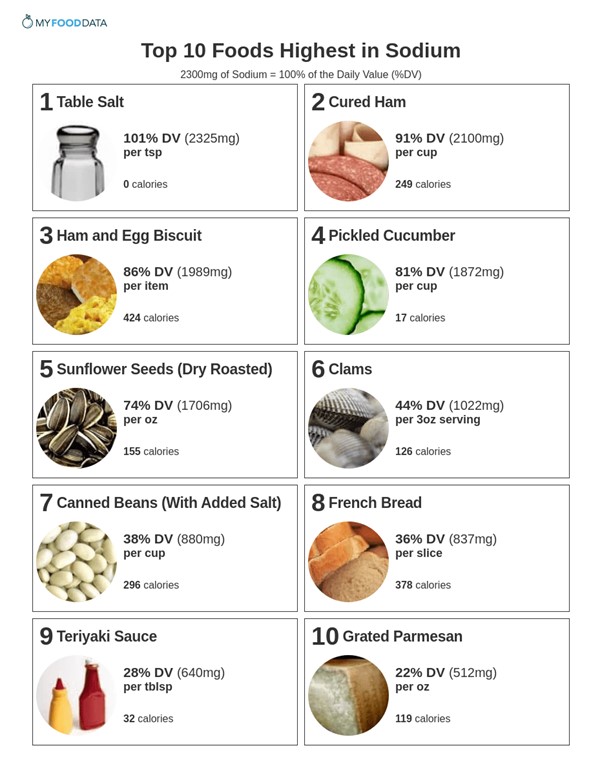The nurse is caring for an older adult who needs to limit sodium intake. Which food should the nurse encourage the client to avoid?
Bananas.
Ground sirloin.
Cottage cheese.
Broccoli.
The Correct Answer is B
Choice A
Bananas are incorrect. Bananas are naturally low in sodium.
Choice B
Ground sirloin is correct. For an older adult who needs to limit sodium intake, the nurse should encourage avoiding foods that are high in sodium. Processed meats, including ground meats like ground sirloin, are often higher in sodium due to added preservatives and flavourings. These additives can significantly contribute to sodium content. Encouraging the client to choose lean meats and to avoid processed meats can help reduce sodium intake.
Choice C
Cottage cheese is incorrect. While cottage cheese might contain some sodium, it's usually lower in sodium compared to processed meats.
Choice D
Broccoli is incorrect. Broccoli is a vegetable that is naturally low in sodium.

Nursing Test Bank
Naxlex Comprehensive Predictor Exams
Related Questions
Correct Answer is B
Explanation
Choice A
Advising the client that too much fruit can irritate the colon is not the right choice. While it's true that excessive consumption of certain fruits can cause gastrointestinal discomfort, this information is not directly related to celiac disease or the selected meal.
Choice B
Informing the client that oatmeal contains gluten is the right choice. Celiac disease is an autoimmune disorder in which consuming gluten, a protein found in wheat, rye, and barley, triggers an immune response that damages the small intestine. Oatmeal itself is naturally gluten-free, but it is often processed in facilities that also process gluten-containing grains, which can lead to cross-contamination. Therefore, it's important for individuals with celiac disease to choose certified gluten-free oats to avoid adverse reactions.
Choice C
Commending the client for selecting fat-free milk is not the best choice. While choosing a healthier milk option is beneficial for overall health, it is not the most important action in this situation, considering the client's celiac disease.
Choice D reason;
Encouraging the client to choose decaffeinated coffee is not the right choice. The choice of caffeinated or decaffeinated coffee is a matter of preference and is not directly related to celiac disease or the potential for gluten exposure from the oatmeal.
Correct Answer is C
Explanation
Choice A
Soft low-residue diet should not be recommended. This diet is often used for individuals with gastrointestinal issues and aims to reduce the bulk and frequency of bowel movements. It might not be necessary for this client's dental concerns.
Choice B
Pureed diet should not be recommended. A pureed diet involves blending foods to a smooth consistency, which is often recommended for individuals with severe difficulty swallowing or chewing. Since the client has no teeth but doesn't necessarily have difficulty swallowing, a pureed diet might be overly restrictive.
Choice C
Mechanical soft diet should not be recommended. mechanical soft diet consists of foods that are easy to chew and swallow, making it suitable for individuals with dental issues or difficulty chewing. It includes foods that are softer in texture, often cooked until they are tender and easy to manipulate with a fork or spoon. This type of diet would be beneficial for the client in question, as it accommodates his lack of teeth and ensures that he can consume a variety of foods without the need for extensive chewing.
Choice D
Full liquid diet should be recommended. A full liquid diet includes foods in liquid form, such as soups, milk, and juice. While it's easy to swallow, it might not provide the necessary variety and texture for the client's nutritional needs.
Whether you are a student looking to ace your exams or a practicing nurse seeking to enhance your expertise , our nursing education contents will empower you with the confidence and competence to make a difference in the lives of patients and become a respected leader in the healthcare field.
Visit Naxlex, invest in your future and unlock endless possibilities with our unparalleled nursing education contents today
Report Wrong Answer on the Current Question
Do you disagree with the answer? If yes, what is your expected answer? Explain.
Kindly be descriptive with the issue you are facing.
